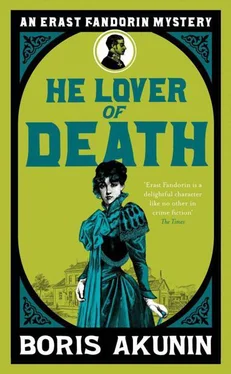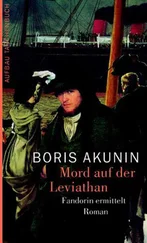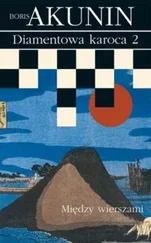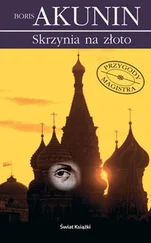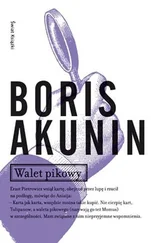He dragged Senka across to the table where the book was. In a picture Senka saw a rod exactly like the ones he’d sold to the jeweller. And a big picture of the end, with the letters ‘MM’.
‘The “MM” means “Moscow Mint”,’ Kuvshinnikov explained. It was also called the New Mint or the English Mint. In the olden days Russia didn’t have much silver of its own, so they used to buy European coins – joachimsthalers, or yefimoks. Senka nodded again at the familiar word, but this time in earnest. ‘They melted the thalers down and made silver rods like that, then they drew them out into wire, cut pieces off it, flattened them and minted kopecks –“scales”, they were called. A lot of kopecks have survived, and even more thalers, but there are no silver billets, or rods, left at all. Well, naturally – they all were all used up.’
‘What about this one?’ asked Senka, pointing to the picture.
‘Well done,’ the judge said approvingly. ‘You use your head. Quite right, Spidorov. Only one rod came down to our times, minted at the Moscow or New Mint.’
Senka thought about that.
‘Why would those silversmiths have dumped the billets and not stamped coins out of them?’
Kuvshinnikov shrugged. ‘It’s a mystery.’ His eyes weren’t narrow and piercing now, they were wide-open and glowing, as if the judge was really surprised or delighted. ‘Although it’s not that great a mystery, if you give it a little thought. A lot of stealing went on in the seventeenth century, even more so than now. Look here, it says in the encyclopedia . . .’ – and he ran his hand down the page; ‘“For so-called ‘smelting losses’ the craftsmen were beaten mercilessly with a knout, and some had their nostrils torn out, but they were not dismissed, because silversmiths were in short supply”. Clearly they didn’t beat them hard enough if someone made a secret hoard of silver “lost in smelting”. Or perhaps it wasn’t the craftsmen they should have beaten, but the clerks.’
The judge turned to his book. Suddenly he whistled. Senka was really surprised: a man like that, and him whistling.
‘Senya, how did much did you sell your rods for?’
Senka didn’t see the point in lying. Kuvshinnikov was a rich man himself, he wouldn’t be jealous.
‘Four hundred.’
‘It says here that fifty years ago, at an auction in London, this bar was acquired by a collector for seven hundred pounds sterling. That’s seven thousand roubles, and in today’s money probably a lot more.’
Senka’sjaw dropped. Why, that Ashot Ashotovich, what a snake!
‘You see, Spidorov, if you’d given your treasure to the state treasury
‘What joy would I get out of that?’ Senka snarled, still smarting at the jeweller’s treachery.
‘Well, the silver was stolen from the treasury. It may have been two hundred years ago, but it’s the same state, still Russia. For handing over a treasure trove to the authorities, according to the law, the finder is entitled to a third of its value. So for your five bars, you would have received a lot more than just two thousand. And in addition you would have been an honest man, helping your motherland.’
Senka was about to say that could be put right – but he bit his tongue just in time. He would have to think long and hard before he started blabbing. Kuvshinnikov was sharp-witted, he’d worm the whole thing out of him in a trice.
The looks the judge was giving Senka were knowing enough as it was.
‘All right,’ said Kuvshinnikov. ‘Just give a little thought to where you’d take the bars, if you happened to find any more: to a fence or to the treasury. If you decide to follow the law, I’ll tell you how to do it. The newspapers will write about your patriotism.’
‘About what?’
‘About you not just filling your belly, but loving your homeland, that’s what.’
Senka wasn’t too sure about the homeland part. Where was his homeland, anyway? Sukharevka, was it, or Khitrovka? Why should he love those lousy dives?
Then Kuvshinnnikov surprised him again. He sighed. ‘So, Zot lied to me about the grammar school. And about everything else too, no doubt. . . Very well, he’ll answer to me for that.’
The judge turned sad and hung his grey head. ‘Forgive me, Senya, for buying off my conscience with a hundred roubles. I could have called to check how you were getting on at least once. When your father died, I wanted to take both of you in, but Puzyrev clung on to you like grim death – he’s my nephew, he said, my sister’s flesh and blood. But it would seem money was the only thing on his mind.’
Senka’s thoughts briefly turned away from money to something completely different: how would everything have turned out if he’d been taken in by Judge Kuvshinninkov instead of Uncle Zot?
But what point was there in eating his heart out now?
Senka asked sullenly: ‘Won’t you let me see Vanka?’
The judge paused for a moment before he answered. ‘Well now, you’ve spoken to me honestly, and you’re not an entirely hopeless case. So yes, you can see each other. Why shouldn’t you? Vanya’s French lesson has just finished. Go to the nursery. The maid will show you the way.’
And Senka needn’t have worried about his little brother.
When they told Vanka his big brother had arrived, he ran out to meet him, jumped right up and threw his arms round Senka’s neck.
‘Aha! I did it, I wrote him a letter! Senya, you look just the way I imagined you!’ Then he corrected himself. ‘Not imagined, remembered. You haven’t changed at all, even the tie’s still the same!’
What a brazen liar the little scamp was!
Senka gave him the bonbonnier and some other presents: binoculars and a penknife – the same one, with the nail file on it. Of course, Vanka immediately forgot all about his brother and started fiddling with the blades – but that was all right, kids will be kids.
Senka shook the judge’s hand when he said goodbye and promised to come again in a couple of days.
He walked back almost all the way to the Kaluga Gate, deep in thought.
Seven thousand a rod! If he didn’t force down the price, he could live like a king for a whole year – on just one rod.
He had to put his wits to work, use that noggin a bit.
As a certain individual, who has already been mentioned, had taught him: ‘He who think rittur, cry man’ tears.’
Story Four. About the Japanese man Masa
Meaning: ‘He who thinks little, cries many tears’. This individual could not pronounce the Russian ‘l’ because there was no such letter in the language where he was from. But apparently they managed somehow, they got by.
So now it is time to tell you about Senka’s other teacher, who wasn’t hired, but self-appointed.
It happened like this.
The day after the ballet, when Senka was feeling unwell first thing in the morning, and then was cured by champagne and pate, he had an unexpected visitor.
There was a knock on the door – a quiet, well-mannered knock. He thought it was the landlady.
But when he opened the door he saw the Japanese, from yesterday.
Senka got an awful fright. Now the Jap would start belting him and asking why he had scampered off before being called to account for his stealing.
The Japanese said hello and asked: ‘Why you trembur?’
Senka told him straight: ‘I’m trembling because I’m afraid for my life. Afraid you might do me in, mister.’
The Japanese was surprised: ‘You mean, Senka-kun, that you afrai’ of death?’
‘Who isn’t afraid of it?’ Senka answered. The question sounded like a threat, and Senka backed away towards the window. He’d thought maybe he could leap from the window. But it was a bit on the high side, otherwise he’d definitely have jumped.
Читать дальше
